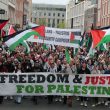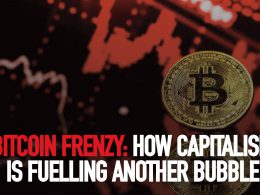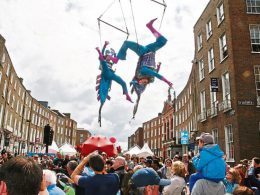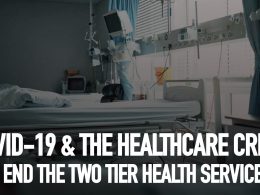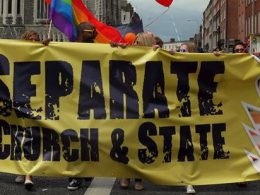By Conor Payne
The local and European elections in the south of Ireland elections are being hailed as a victory for “the centre” – the political establishment – given the unexpectedly poor performance of Sinn Féin, and the comparatively good results for the government parties. The result was indeed a disaster for Sinn Féin, which made small gains in the local elections (the European results are still coming in at time of writing), but hugely underperformed in light of recent polling and its result from the 2020 General election.
Sinn Féin got just 11.8% of the vote; compared to 24.5% in the General Election. This result undoubtedly reflects in part the impact of anti-immigration sentiments – the injection of these ideas has predictably worked to the benefit of FF and FG. Instead of coming out fighting against the far-right and right populism, Sinn Féin tried to regain support by moving to the right on immigration and refugee rights.
Every Sinn Féin local election candidate distributed a leaflet touting the party’s opposition to mythical “open borders”, aping the language of the right. This strategy failed miserably as it lacked credibility to those affected by anti-immigration sentiments while also alienating many young and more left-wing people within their base.
Sinn Féin’s rightward drift has damaged them
However, the problems for Sinn Féin go deeper; it is also paying the price of a conscious strategy of moving towards the centre and lowering expectations among its working-class supporters in order to prepare for power. This has been reflected on issues such as Palestine; participating in the White House visit and having to be dragged into supporting the expulsion of the Israeli ambassador. It is now widely sensed that Sinn Féin has softened its cough, and many voters who were open to Sinn Féin in the past now talk about them in the same breath as FF and FG.
It remains to be seen whether Sinn Féin can recover in the run up to a General Election, where it will pose itself as the only viable alternative to the current government. However, the enthusiasm generated just a few years ago has clearly gone.
Triumphalism of government is misplaced
At the same time, the Government’s triumphalism is also misplaced. While it is certainly the case that the coalition parties are strengthened by the collapse in support of their main electoral rival, this election has not been a display of confidence in the Government. Despite all the talk, all three of the coalition parties lost both vote share and seats compared to the local elections five years ago. The combined vote of FF and FG was the lowest ever for a local election. And the Greens lost nearly half their seats. This was in the context of a historically low turnout, especially among young people, which will generally favour the more conservative parties with an electorate which is disproportionately older and wealthier. There remains mass anger at this Government’s abysmal record on housing, cost of living, public services and at the huge inequality it stands over and upholds. This will be expressed much more clearly in a General Election where the government itself is to be decided.
Who can take advantage of this anger and political vacuum? The support for far-right and right-populists in this election is an important warning. While their support is still modest, far-right parties and individuals did succeed in winning a number of council seats across the country. This includes a seat for the fascistic National Party in Blanchardstown and the election of far-right agitators Malachy Steenson and Gavin Pepper to Dublin City Council. Another far-right activist, Derek Blighe, received 25,000 votes for Europe in Ireland South (though he failed to win a council seat in Fermoy).
“Softer” right-wing populist figures also had notable successes. While Niall Boylan thankfully failed to be elected to Europe from Dublin, similar independents may still win other Euro seats. In the local elections, Independent Ireland won 23 seats, while Aontú won eight. The distrust of all the main parties is reflected in a growing support for Independents – though in reality most Independents are from FF and FG backgrounds and have no intention of posing any opposition to the status quo. It is vital that this type of politics is not allowed to fill the vacuum.
Potential and need for a genuine left
These elections probably speed up the timeline for a General Election, as the Government seeks to take advantage of Sinn Féin’s disarray. There is an urgent need to build a fighting left and socialist alternative, independent of all the main parties, including Sinn Féin, that can offer a clear way forward on all the crises impacting working-class and oppressed people, while taking a clear stand against the scapegoating of migrants or other marginalised groups.
The potential that exists has been shown in the generally good results for the left in a difficult context. People Before Profit made gains, going from 6 to 10 seats. In Dublin West, the Socialist Party re-elected John Burtchaell in Blanchardstown-Mulhuddart, while Ruth Coppinger gained a seat in Castleknock. In Cork City North-West, Socialist Party councillor Brian McCarthy also retained his seat, fighting back a challenge from far-right agitator Ross Lahive. This victory shows the potential to defeat the far-right with a fighting and principled socialist approach. While Socialist Party councillors Kieran Mahon and Leah Whelan in Tallaght were unfortunately not re-elected, with Kieran narrowly missing out, People Before Profit won seats in these wards.
The Socialist Party has come out of this election in a strengthened position to win seats in the impending General Election with Mick Barry TD Cork North Central and Ruth Coppinger in Dublin West. It is crucial that we elect socialists and Marxists to the next Dáail to point a way forward in this time of capitalist polycrisis, helping to build a genuine left and socialist political challenge and alternative to the status quo, one that is rooted in struggles of workers, communities, women and queer people, the disabled community, and people of colour and migrants resisting racism. Get involved now to help us build this.






